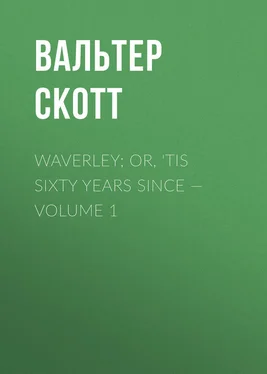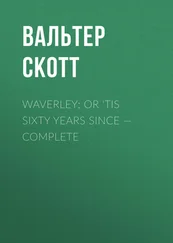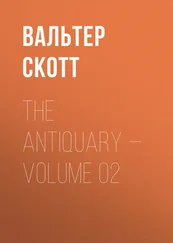Вальтер Скотт - Waverley; Or, 'Tis Sixty Years Since — Volume 1
Здесь есть возможность читать онлайн «Вальтер Скотт - Waverley; Or, 'Tis Sixty Years Since — Volume 1» — ознакомительный отрывок электронной книги совершенно бесплатно, а после прочтения отрывка купить полную версию. В некоторых случаях можно слушать аудио, скачать через торрент в формате fb2 и присутствует краткое содержание. Издательство: Иностранный паблик, Жанр: foreign_antique, foreign_prose, на английском языке. Описание произведения, (предисловие) а так же отзывы посетителей доступны на портале библиотеки ЛибКат.
- Название:Waverley; Or, 'Tis Sixty Years Since — Volume 1
- Автор:
- Издательство:Иностранный паблик
- Жанр:
- Год:неизвестен
- ISBN:нет данных
- Рейтинг книги:4 / 5. Голосов: 1
-
Избранное:Добавить в избранное
- Отзывы:
-
Ваша оценка:
- 80
- 1
- 2
- 3
- 4
- 5
Waverley; Or, 'Tis Sixty Years Since — Volume 1: краткое содержание, описание и аннотация
Предлагаем к чтению аннотацию, описание, краткое содержание или предисловие (зависит от того, что написал сам автор книги «Waverley; Or, 'Tis Sixty Years Since — Volume 1»). Если вы не нашли необходимую информацию о книге — напишите в комментариях, мы постараемся отыскать её.
Waverley; Or, 'Tis Sixty Years Since — Volume 1 — читать онлайн ознакомительный отрывок
Ниже представлен текст книги, разбитый по страницам. Система сохранения места последней прочитанной страницы, позволяет с удобством читать онлайн бесплатно книгу «Waverley; Or, 'Tis Sixty Years Since — Volume 1», без необходимости каждый раз заново искать на чём Вы остановились. Поставьте закладку, и сможете в любой момент перейти на страницу, на которой закончили чтение.
Интервал:
Закладка:
Other illustrations of Waverley will be found in the Notes at the foot of the pages to which they belong. Those which appeared too long to be so placed are given at the end of the chapters to which they severally relate. [Footnote: In this edition at the end of the several volumes.]
PREFACE TO THE THIRD EDITION
To this slight attempt at a sketch of ancient Scottish manners the public have been more favourable than the Author durst have hoped or expected. He has heard, with a mixture of satisfaction and humility, his work ascribed to more than one respectable name. Considerations, which seem weighty in his particular situation, prevent his releasing those gentlemen from suspicion by placing his own name in the title-page; so that, for the present at least, it must remain uncertain whether Waverley be the work of a poet or a critic, a lawyer or a clergyman, or whether the writer, to use Mrs. Malaprop's phrase, be, 'like Cerberus, three gentlemen at once.' The Author, as he is unconscious of anything in the work itself (except perhaps its frivolity) which prevents its finding an acknowledged father, leaves it to the candour of the public to choose among the many circumstances peculiar to different situations in life such as may induce him to suppress his name on the present occasion. He may be a writer new to publication, and unwilling to avow a character to which he is unaccustomed; or he may be a hackneyed author, who is ashamed of too frequent appearance, and employs this mystery, as the heroine of the old comedy used her mask, to attract the attention of those to whom her face had become too familiar. He may be a man of a grave profession, to whom the reputation of being a novel-writer might be prejudicial; or he may be a man of fashion, to whom writing of any kind might appear pedantic. He may be too young to assume the character of an author, or so old as to make it advisable to lay it aside.
The Author of Waverley has heard it objected to this novel, that, in the character of Callum Beg and in the account given by the Baron of Bradwardine of the petty trespasses of the Highlanders upon trifling articles of property, he has borne hard, and unjustly so, upon their national character. Nothing could be farther from his wish or intention. The character of Callum Beg is that of a spirit naturally turned to daring evil, and determined, by the circumstances of his situation, to a particular species of mischief. Those who have perused the curious Letters from the Highlands, published about 1726, will find instances of such atrocious characters which fell under the writer's own observation, though it would be most unjust to consider such villains as representatives of the Highlanders of that period, any more than the murderers of Marr and Williamson can be supposed to represent the English of the present day. As for the plunder supposed to have been picked up by some of the insurgents in 1745, it must be remembered that, although the way of that unfortunate little army was neither marked by devastation nor bloodshed, but, on the contrary, was orderly and quiet in a most wonderful degree, yet no army marches through a country in a hostile manner without committing some depredations; and several, to the extent and of the nature jocularly imputed to them by the Baron, were really laid to the charge of the Highland insurgents; for which many traditions, and particularly one respecting the Knight of the Mirror, may be quoted as good evidence. [Footnote: A homely metrical narrative of the events of the period, which contains some striking particulars, and is still a great favourite with the lower classes, gives a very correct statement of the behaviour of the mountaineers respecting this same military license; and, as the verses are little known, and contain some good sense, we venture to insert them.]
THE AUTHOR'S ADDRESS TO ALL IN GENERAL
Now, gentle readers, I have let you ken
My very thoughts, from heart and pen,
'Tis needless for to conten'
Or yet controule,
For there's not a word o't I can men';
So ye must thole.
For on both sides some were not good;
I saw them murd'ring in cold blood,
Not the gentlemen, but wild and rude,
The baser sort,
Who to the wounded had no mood
But murd'ring sport!
Ev'n both at Preston and Falkirk,
That fatal night ere it grew mirk,
Piercing the wounded with their durk,
Caused many cry!
Such pity's shown from Savage and Turk
As peace to die.
A woe be to such hot zeal,
To smite the wounded on the fiell!
It's just they got such groats in kail,
Who do the same.
It only teaches crueltys real
To them again.
I've seen the men call'd Highland rogues,
With Lowland men make shangs a brogs,
Sup kail and brose, and fling the cogs
Out at the door,
Take cocks, hens, sheep, and hogs,
And pay nought for.
I saw a Highlander,'t was right drole,
With a string of puddings hung on a pole,
Whip'd o'er his shoulder, skipped like a fole,
Caus'd Maggy bann,
Lap o'er the midden and midden-hole,
And aff he ran.
When check'd for this, they'd often tell ye,
'Indeed her nainsell's a tume belly;
You'll no gie't wanting bought, nor sell me;
Hersell will hae't;
Go tell King Shorge, and Shordy's Willie,
I'll hae a meat.'
I saw the soldiers at Linton-brig,
Because the man was not a Whig,
Of meat and drink leave not a skig,
Within his door;
They burnt his very hat and wig,
And thump'd him sore.
And through the Highlands they were so rude,
As leave them neither clothes nor food,
Then burnt their houses to conclude;
'T was tit for tat.
How can her nainsell e'er be good,
To think on that?
And after all, O, shame and grief!
To use some worse than murd'ring thief,
Their very gentleman and chief,
Unhumanly!
Like Popish tortures, I believe,
Such cruelty.
Ev'n what was act on open stage
At Carlisle, in the hottest rage,
When mercy was clapt in a cage,
And pity dead,
Such cruelty approv'd by every age,
I shook my head.
So many to curse, so few to pray,
And some aloud huzza did cry;
They cursed the rebel Scots that day,
As they'd been nowt
Brought up for slaughter, as that way
Too many rowt.
Therefore, alas! dear countrymen,
O never do the like again,
To thirst for vengeance, never ben'
Your gun nor pa',
But with the English e'en borrow and len',
Let anger fa'.
Their boasts and bullying, not worth a louse,
As our King's the best about the house.
'T is ay good to be sober and douce,
To live in peace;
For many, I see, for being o'er crouse,
Gets broken face.
CHAPTER I
INTRODUCTORY
The title of this work has not been chosen without the grave and solid deliberation which matters of importance demand from the prudent. Even its first, or general denomination, was the result of no common research or selection, although, according to the example of my predecessors, I had only to seize upon the most sounding and euphonic surname that English history or topography affords, and elect it at once as the title of my work and the name of my hero. But, alas! what could my readers have expected from the chivalrous epithets of Howard, Mordaunt, Mortimer, or Stanley, or from the softer and more sentimental sounds of Belmour, Belville, Belfield, and Belgrave, but pages of inanity, similar to those which have been so christened for half a century past? I must modestly admit I am too diffident of my own merit to place it in unnecessary opposition to preconceived associations; I have, therefore, like a maiden knight with his white shield, assumed for my hero, WAVERLEY, an uncontaminated name, bearing with its sound little of good or evil, excepting what the reader shall hereafter be pleased to affix to it. But my second or supplemental title was a matter of much more difficult election, since that, short as it is, may be held as pledging the author to some special mode of laying his scene, drawing his characters, and managing his adventures. Had I, for example, announced in my frontispiece, 'Waverley, a Tale of other Days,' must not every novel-reader have anticipated a castle scarce less than that of Udolpho, of which the eastern wing had long been uninhabited, and the keys either lost, or consigned to the care of some aged butler or housekeeper, whose trembling steps, about the middle of the second volume, were doomed to guide the hero, or heroine, to the ruinous precincts? Would not the owl have shrieked and the cricket cried in my very title-page? and could it have been possible for me, with a moderate attention to decorum, to introduce any scene more lively than might be produced by the jocularity of a clownish but faithful valet, or the garrulous narrative of the heroine's fille- de-chambre, when rehearsing the stories of blood and horror which she had heard in the servants' hall? Again, had my title borne, 'Waverley, a Romance from the German,' what head so obtuse as not to image forth a profligate abbot, an oppressive duke, a secret and mysterious association of Rosycrucians and Illuminati, with all their properties of black cowls, caverns, daggers, electrical machines, trap-doors, and dark-lanterns? Or if I had rather chosen to call my work a 'Sentimental Tale,' would it not have been a sufficient presage of a heroine with a profusion of auburn hair, and a harp, the soft solace of her solitary hours, which she fortunately finds always the means of transporting from castle to cottage, although she herself be sometimes obliged to jump out of a two-pair-of-stairs window, and is more than once bewildered on her journey, alone and on foot, without any guide but a blowzy peasant girl, whose jargon she hardly can understand? Or, again, if my Waverley had been entitled 'A Tale of the Times,' wouldst thou not, gentle reader, have demanded from me a dashing sketch of the fashionable world, a few anecdotes of private scandal thinly veiled, and if lusciously painted, so much the better? a heroine from Grosvenor Square, and a hero from the Barouche Club or the Four-in-Hand, with a set of subordinate characters from the elegantes of Queen Anne Street East, or the dashing heroes of the Bow-Street Office? I could proceed in proving the importance of a title-page, and displaying at the same time my own intimate knowledge of the particular ingredients necessary to the composition of romances and novels of various descriptions; — but it is enough, and I scorn to tyrannise longer over the impatience of my reader, who is doubtless already anxious to know the choice made by an author so profoundly versed in the different branches of his art.
Читать дальшеИнтервал:
Закладка:
Похожие книги на «Waverley; Or, 'Tis Sixty Years Since — Volume 1»
Представляем Вашему вниманию похожие книги на «Waverley; Or, 'Tis Sixty Years Since — Volume 1» списком для выбора. Мы отобрали схожую по названию и смыслу литературу в надежде предоставить читателям больше вариантов отыскать новые, интересные, ещё непрочитанные произведения.
Обсуждение, отзывы о книге «Waverley; Or, 'Tis Sixty Years Since — Volume 1» и просто собственные мнения читателей. Оставьте ваши комментарии, напишите, что Вы думаете о произведении, его смысле или главных героях. Укажите что конкретно понравилось, а что нет, и почему Вы так считаете.












